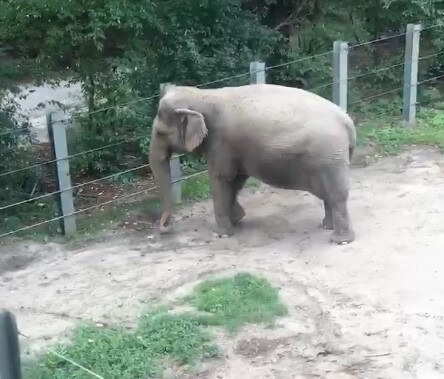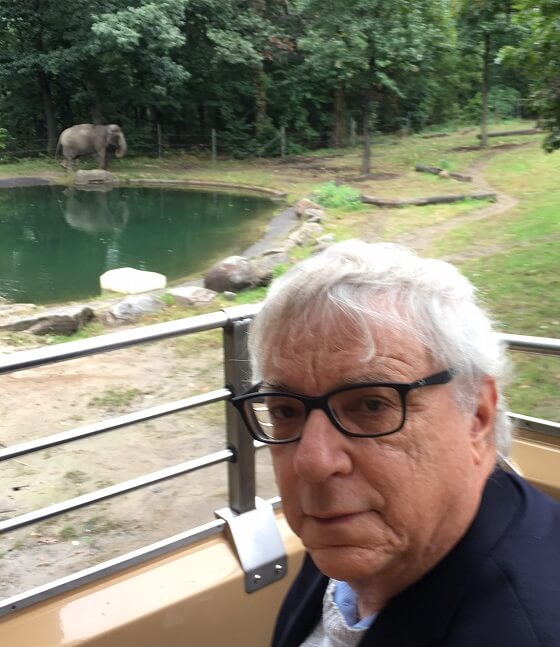What are the implications of this for captive whales and dolphins?
Last month, on November 16th, a New York State judge issued a habeas corpus order on behalf of Happy, one of the elephants at the Bronx Zoo.
The Hon. Tracey A. Bannister ordered the Director of the zoo to appear in court at a hearing on December 14th, so the court can determine whether Happy “is being unlawfully imprisoned” and should be released immediately to an appropriate sanctuary.
By issuing a habeas corpus order on the elephant’s behalf, Judge Bannister implicitly recognized her as a “legal person” who has the capacity for certain legal rights – in this case, the fundamental right to bodily liberty.

Photo by Nonhuman Rights Project
The lawsuit was brought by the Nonhuman Rights Project (NhRP), and it marks the second time a judge has issued a writ of habeas corpus for a nonhuman animal. Two years ago, in another case brought by the NhRP, Judge Barbara Jaffe ordered the Attorney General of New York, representing Stony Brook University, to appear in court and provide a legally sufficient reason why two chimpanzees, Hercules and Leo, should continue to be held at the university for laboratory experiments.
In requiring the A.G. to show cause, the judge was implicitly affirming that your right to have your day in court does not apply exclusively to humans. It does not depend on what species you are, any more than it depends on your skin color or your gender. Rather, it depends on the degree of autonomy – the ability to determine and pursue your own course in life – that you exhibit. (While their case was still working its way through the legal system, Hercules and Leo were voluntarily transferred by their “owners” to a sanctuary.)
How legal opinion is evolving
The two cases represent a remarkable evolution of opinion in the legal system of the United States and most other countries, where nonhuman animals are still treated as “legal things” that are the property of the human beings who “own” them.
“Elephants are autonomous beings,” says attorney Steven M. Wise, President of the NhRP. “They are extraordinarily cognitively complex, and they ought to have fundamental legal rights that protect these fundamental cognitive characteristics.”
Scientific evidence clearly demonstrates that great apes and elephants demonstrate autonomy. The same is the case for orcas and other cetaceans (whales, dolphins and porpoises). So, might they, too, get their day in court soon? Wise says his legal team is already considering the possibilities of filing suit on behalf of an orca.

The lawsuits being brought by the NhRP are fundamentally different from other kinds of cases on behalf of nonhuman animals in that they do not seek better treatment of those animals. They are not to do with animal welfare. They don’t, for example, invoke laws that protect animals against cruelty. Instead, they address the more basic issue of whether that animal has the legal right not to be held captive in the first place.
Getting to this point has taken decades of research and preparation, during which Wise wrote three books on the topic of legal rights, including one that tells the story of the landmark court case in 1772 regarding a slave, James Somerset, who had escaped from his owner while accompanying him on a business trip to England. Somerset had been recaptured, but a group of abolitionist attorneys filed suit on his behalf challenging the slave’s classification as a “legal thing.” The case went before the Chief Justice of the Court of King’s Bench, Lord Mansfield, who, in what became one of the most important trials in legal history, ruled that Somerset was not a piece of property, but a “legal person,” and set him free.
Similarly, Wise argues that with their advanced cognitive skills, certain nonhuman animals should also have the right to bodily liberty. And since they cannot exercise that right at an entertainment facility or laboratory, and also cannot simply be set free, they should go to a suitable sanctuary.
Wise knew from the start that his work would be an uphill battle. Most of us humans still cling to the notion that we are fundamentally different from and superior to other animals. But public opinion is changing, and the legal wall that separates all humans from all other animals has now begun to crack.
“Our approach was that if we kept presenting the arguments, and if the arguments were good and the facts were good, then judges would begin to come around,” Wise says.
No court has yet ordered the actual release of a nonhuman animal. But when one of the NhRP’s chimpanzee suits reached New York State’s highest court, the Court of Appeals, one of the judges wrote:
“To treat a chimpanzee as if he or she had no right to liberty protected by habeas corpus is to regard the chimpanzee as entirely lacking independent worth, as a mere resource for human use, a thing the value of which consists exclusively in its usefulness to others. Instead, we should consider whether a chimpanzee is an individual with inherent value who has the right to be treated with respect.”
Other judges are taking note. In a recent criminal case in New York City regarding maltreatment of a dog, the judge wrote of:
“… an emerging awareness of the injustice of treating animals as ‘things,’ and [of] present efforts to change the status of non-human animals from ‘things’ to legally recognized ‘persons,’ for the purpose of habeas corpus protection.”
And a New York State appellate court recently wrote that “it is common knowledge that personhood can and sometimes does attach to nonhuman entities like corporations or animals.”
The difference between animal welfare and legal rights
The Bronx Zoo has reacted to the habeas corpus petition by noting that Happy shows “no signs of physiological or psychological stress.” But the zoo’s statement misses the point in that the question before Judge Bannister is not whether Happy should be cared for better. The issue in a habeas case is not one of animal welfare, but of legal rights: the right, in this case, not to be held at the zoo in the first place.
“Let’s say your wife is kidnapped,” Wise explains, “and you want to bring a writ of habeas corpus to have her freed. And the kidnappers’ defense is that your wife shows no signs of stress, so you can’t have her back.
“Well, of course, you say: ‘What the heck are you talking about? You don’t have the right to keep her imprisoned.’
“It’s the same thing in Happy’s case. We’re not getting into the question of whether she’s happy or sad. We just want her out!”
What these cases could mean for whales and dolphins
What, then, could all of this mean in the future for orcas, belugas and other cetaceans at marine entertainment parks? If a suit were to be filed on behalf of, say, an orca, two key questions would have to be answered:
First: Does she have the degree of advanced cognition and autonomy to be recognized as a “legal person” with the right to bodily liberty? The scientific evidence says yes for orcas as clearly as it does for chimpanzees and elephants.
That brings us to the second question: Can the plaintiff be set free? Since writs of habeas corpus provide for the immediate release of the person being held captive, the judge would want assurance that the orca could be released from captivity – i.e. that she could either be released directly into the ocean (not an option for whales who are not used to providing for themselves), or could be placed in a sanctuary.
Sanctuaries already exist for great apes and elephants, so habeas corpus lawsuits are already a practical strategy for them. But Wise says that a seaside sanctuary would need to be at least close to completion before it would make sense to file a habeas corpus suit on behalf of a cetacean.
Meanwhile, the pioneering work of the Nonhuman Rights Project is part of a wider sea change that’s taking place in public attitudes toward keeping these highly intelligent and socially complex animals in concrete tanks for the purposes of entertainment.
And all such efforts go hand-in-hand with the work of the Whale Sanctuary Project in ensuring that when the time comes, there will be a sanctuary to welcome them.
7 Comments
Things are happening. One day there will be no more intelligent mammals in captivity. But it won’t be easy. Marineland has been fighting to keep their orca. Edmonton’s River Valley Zoo is doing the same thing to keep Lucy, an elephant who has never seen a congener and who lives by herself surrounded only by humans. Sanctuaries have offered to take her, but the zoo refuses. They still make money on the back of this magnificent and intelligent mammals.
OrcamonthBC is thrilled for Happy and for captive whales in future.
@orcamonthbc
Great news, thank you MIchael mountain and mr. Wise , and mr Bannister.
What wonderful NEWS!!!
Finally!!!!!
The humans are getting it!!!!!!!
May Captivity End !
Captivity kills no matter what form it is in. Yes Animals feel more than we do if not more. Dolphins for example have bigger brains than we do. Are complex recognize themselves in mirrors etc. Animals are paying the price for man’s greed and ignorance
This is the kind of outcome from compassionate, empathetic and knowledgeable animal rights people and these judges that bring me to tears. The ridicule, insults and apathy expressed at my grief for these animals has been little price to pay when I see successes like this. Goodness, kindness, understanding, does prevail.
The Outermost House: A Year of Life on the Great Beach of Cape Cod by Henry Beston
“We need another and a wiser and perhaps a more mystical concept of animals. Remote from universal nature and living by complicated artifice, man in civilization surveys the creature through the glass of his knowledge and sees thereby a feather magnified and the whole image in distortion. We patronize them for their incompleteness, for their tragic fate for having taken form so far below ourselves. And therein do we err. For the animal shall not be measured by man. In a world older and more complete than ours, they move finished and complete, gifted with the extension of the senses we have lost or never attained, living by voices we shall never hear. They are not brethren, they are not underlings: they are other nations, caught with ourselves in the net of life and time, fellow prisoners of the splendour and travail of the earth.”
― Henry Beston, The Outermost House: A Year of Life on the Great Beach of Cape Cod
Corie that is my very favorite quote! One I try to live by.